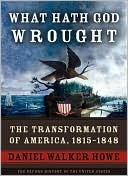But the tariff, by reducing the supply of dollars in foreign hands, limited the overseas market for their crops and encouraged their customers to look for alternative sources of supply. Rice producers suffered more from the tariff than cotton producers because the world demand for rice was more economically “elastic.”86 Furthermore, with over 50 percent of their total wealth invested in human beings, these particular large-scale capitalists felt that they had the greatest stake in the slave system of anyone in America.
Welcome back. Just a moment while we sign you in to your Goodreads account.


